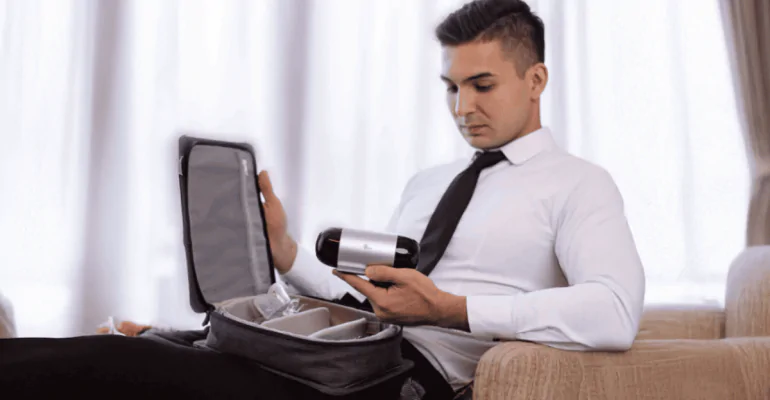Travel CPAP Buying Guide: How to Choose the Right CPAP for Travel
March 21, 2025 2025-11-21 19:00Travel CPAP Buying Guide: How to Choose the Right CPAP for Travel

Travel CPAP Buying Guide: How to Choose the Right CPAP for Travel
If you treat sleep apnea with a CPAP machine, travel may seem difficult. TSA rules, limited power, and bulky machines can make carrying your CPAP difficult.
The good news is that mobile CPAP devices are meant to simplify life for those who live constantly on the go.
Whether your trip is a road trip, vacation, or business flight, the correct travel CPAP will guarantee continuous sleep therapy free from additional travel stress.
Everything you need to think about before making a purchase will be broken out in this extensive travel CPAP buying guide.
1. Selecting Manual vs. Auto CPAP Devices
Choosing a travel CPAP starts with weighing manual (fixed pressure) vs auto (APAP) equipment.
✅ Manual CPAP: Your doctor has prescribed a fixed pressure setting these machines provide. Though they are consistent, they do not change depending on your breathing requirements.
✅ Auto-Adjusting CPAP (APAP): Based on real-time data from your breathing, these automatically adjusting CPAP (APAP) machines change pressure levels. This is a more handy and versatile solution if your degree of sleep apnea differs.
Travelers would find Auto CPAPs perfect as they adjust to various altitudes and sleeping environments.
Models like BMC M1 Mini Travel Auto CPAP are highly advised if you search for an auto CPAP.
2. Humidification: Do You Need It?
CPAP therapy can sometimes dry out your nose and throat, creating pain. That’s why humidifiers are a crucial component to consider.
- While some portable CPAPs include a water-based humidifier, this might increase weight and call for purified water.
- Many new travel CPAPs, such as ResMed AirMini, use heat-moisture exchange (HME) filters instead of a conventional humidifier, hence increasing their portability and convenience.
👉 Recommendation: If you regularly visit dry climates, choose a CPAP with humidification technology to maintain therapeutic comfort without bringing extra water.
3. Dimensions and portability: How small should it be?
The weight and dimensions are important since you will be travelling and packing and carrying your CPAP.
❈ Lightweight Construction: For simple mobility, seek devices under 1.5 lbs (700g).
🎒Compact Dimensions: Make sure it takes up little space and fits into your luggage or carry-on bag.
💨 Quiet Performance: Under 30dB, a low noise level guarantees your and your trip mates’ comfortable sleep. Frequent travelers would find an excellent fit for some of the smallest and lightest options available: The BMC M1 Mini CPAP and ResMed AirMini Travel CPAP.
4. Auto Altitude Correction: Crucially important for mountain trips and air travel
You may be surprised to learn that altitude influences CPAP performance. At high altitudes, air pressure fluctuates; thus, your CPAP has to alter automatically for efficient therapy.
✔ If you fly regularly or visit high-altitude locations, choose a CPAP with automatic altitude adjustment.
✔ Some machines need manual altitude adjustment, which can be inconvenient.
✔ Top Pick: The Breas Z1 Auto CPAP is well-rated for handling altitude changes without manual interference.
5. Power Options: Remain Connected Anywhere
Travelling calls for great power flexibility. Having several power source choices can help your CPAP work properly whether your travel is flying, camping, or hotel stay.
⚡Battery Backup: A CPAP with built-in or external battery compatibility guarantees therapy even during power outfalls.
🔌Charging: Some contemporary CPAPs, including the Transcend Micro CPAP, come with USB-C charging, which makes charging them simple anyplace.
✆ Voltage Flexibility: Globally, one can use machines switching from 1__00V–240V without adapters.
✨ Recommendation: If you camp or travel internationally, pick a dual-voltage CPAP with long battery life for uninterrupted therapy.
6. FAA & Airline Compliance: Can You Bring Your CPAP on Travel?
If you fly regularly, be sure your travel CPAP is FAA-approved for usage during flight. Airlines allow CPAPs as medical carry-on equipment, meaning they won’t count towards your luggage allowance.
✔ To verify policies, ask your airline ahead of time.
✔ Bring a copy of your prescription in case security asks for it.
✔ Use a travel-friendly carrying case for added convenience.
💆 Quick Tip: The ResMed AirMini and Philips DreamStation Go are both FAA-approved, making them safe for air travel.
FAQs – Answering Your Travel CPAP Questions
🔹 Can I use a CPAP on a plane?
Yes! Most airlines allow CPAP use, but you may need to notify them in advance. A CPAP with battery backup is ideal for long-haul flights.
🔹 Do I need a prescription to buy a travel CPAP?
Yes, CPAP machines require a doctor’s prescription before purchase.
🔹 What’s the quietest travel CPAP?
The ResMed AirMini and Breas Z1 Auto CPAP are known for their ultra-quiet operation (under 30 dB).
Conclusion: How to Choose the Best Travel CPAP for You
Finding the right travel CPAP machine means considering your lifestyle, comfort, and travel needs. Whether you need automatic pressure adjustment, a lightweight design, or reliable battery backup, picking the right features will ensure uninterrupted, stress-free therapy wherever you go.
✅ Key Takeaways:
✔ Auto-adjusting CPAPs are best for travel convenience.
✔ Lightweight & compact designs make portability easier.
✔ Battery options & USB charging provide flexibility on the go.
✔ FAA approval & altitude adjustment are essential for frequent flyers.
💡 Final Tip: Compare different models, read customer reviews, and pick a CPAP that fits your travel lifestyle!
If you are based in Delhi NCR and want to test therapy before buying, you can rent a CPAP machine locally through Respbuy.
🛒 Ready to find your perfect travel CPAP? Explore top-rated models today and enjoy comfortable, uninterrupted sleep—wherever you go!






